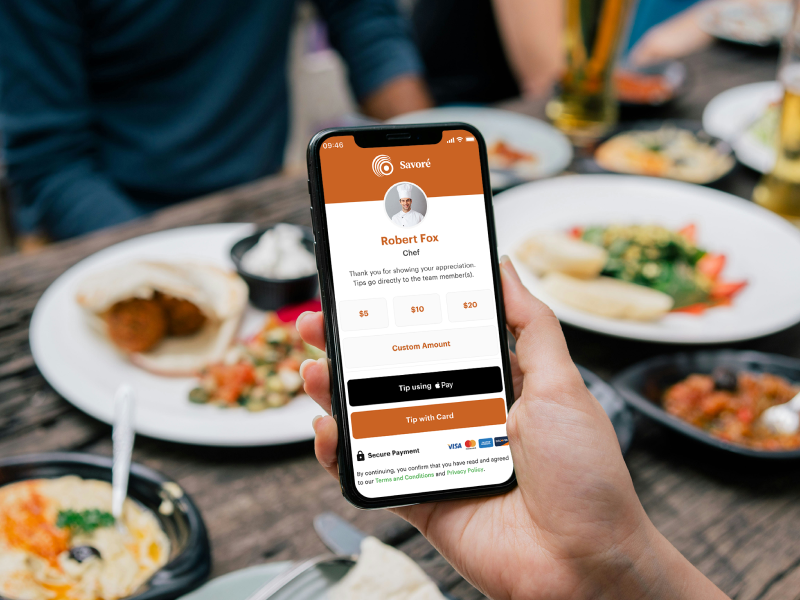How to Maximize Hospitality Employee Engagement in 2025

Key takeaways
- Employee engagement and retention are key to maintaining great service, cutting turnover costs, and boosting profitability in hospitality.
- High turnover drives up hiring and training expenses, disrupts operations, and creates inconsistent guest experiences.
- Offering flexible schedules and career growth opportunities encourages long-term commitment
- Fair pay, transparent tipping policies, and trust-building initiatives improve job satisfaction.
- Recognition and rewards programs motivate staff and encourage loyalty.
- Digital tools like eTip make tip distribution fair while boosting earnings, which strengthens employee engagement.
The hospitality industry continues to face a staffing crisis, with a harrowing annual turnover rate of more than 70%.
This level of disruption has a major impact on operations, leading to increased hiring costs, disrupted service, and declining guest satisfaction.
These are specific consequences that will affect properties differently, but on the whole, employee engagement and retention go hand in hand with business performance.
So how can hospitality businesses build up their employees and empower them to deliver exceptional service, while also increasing retention across their teams?
In this guide, we’re taking a look at some key strategies hospitality leaders can use to improve hospitality employee engagement and retention.
Why hospitality employee engagement matters more than ever
There’s a clear link between employee satisfaction and guest experience.
When employees aren’t engaged, service suffers. Guests notice the inconsistency, leading to frustration, bad reviews, and a damaged reputation.
On the flip side, when employees are invested in their work, they deliver better service — making guests happier and more likely to return.
Gallup’s State of the Global Workplace 2024 report did a good job of illustrating this. It showed that businesses with highly engaged employees see a 23% increase in profitability and a 10% boost in customer loyalty compared to those with disengaged workers.
In the hospitality industry, where positive guest experiences drive repeat bookings, keeping staff motivated is an investment that cannot be overlooked.
Businesses with highly engaged employees see a 23% increase in profitability and a 10% boost in customer loyalty compared to those with disengaged workers.
The cost of high employee turnover in hospitality
The cost of high turnover has long hampered hospitality businesses.
Constantly hiring and training new staff is expensive, with some estimates showing it costs $5,000+ to replace a single employee when you factor in recruitment, training, and lost productivity.
Replacing a single employee costs a business $5,000 on average.
Beyond the dollars and cents
Beyond finances, high hospitality employee turnover also represents a failure to keep individual team members happy. While this unhappiness is harder to quantify than dollars and cents lost in business, it is an important human aspect that should not be overlooked.
Lost institutional knowledge
Another downside that’s hard to quantify is the loss of institutional knowledge when an experienced team member leaves their post.
For example, if a bartender leaves a hotel after 20 years, the financial cost of training a new staff member might be the least of the hotel’s worries.
That particular bartender has had 20 years to hone his craft within the hotel, and may well know how to make drinks that other bartenders don’t. Similarly, they may have developed a deep level of rapport with regulars.
By focusing on improving drivers of hospitality employee engagement, leaders can:
- Improve staff satisfaction
- Reduce turnover
- Create a more profitable business where everyone is happier, from employees to guests to managers.

Key strategies to maximize employee engagement in the hospitality industry
Competitive & transparent compensation
One of the top reasons hospitality employees leave is poor or inconsistent pay. A lack of transparency around tip distribution, payroll errors, and delayed payments can cause dissatisfaction and distrust among staff.
Best practices for fair and transparent compensation:
- Ensure timely and accurate payments, especially for tips.
- Implement clear and fair tip distribution policies.
- Provide real-time earnings tracking so employees can see exactly what they’ve made.
Flexible scheduling & improved work-life balance
Burnout is a major issue in hospitality, where long hours and unpredictable schedules make it difficult for employees to maintain a healthy work-life balance.
Employees who feel overworked and undervalued are more likely to leave for jobs with more stability and flexibility.
While part of this problem is simply due to the nature of hospitality work being highly demanding, there are a few employee-centric policies that hotel managers can implement to support their teams, including:
- Allowing for shift swapping through scheduling apps.
- Offering mental health days or wellness incentives.
- Using predictable scheduling to help employees plan their lives.
The benefits of implementing these practices are twofold:
First, employees gain a bit more breathing space.
Second, employees tend to value managers and workplaces that show a respect for their time and well-being, and this in itself boosts hospitality employee engagement.
Career development opportunities
A lack of upward mobility is another reason hospitality employees leave. Leaders should provide clear career pathways to motivate and retain top talent.
Implementing career growth initiatives will look different from one business to the next, but can range from providing on-the-job training for new skills to establishing mentorship programs to develop future leaders.
Another good strategy is to offer cross-training opportunities so employees can learn multiple roles.
Recognizing & rewarding employee performance
Employees who feel valued and appreciated are more engaged and committed to their roles.
Recognition can be as simple as verbal praise, or as structured as an Employee of the Month program.
Ways to recognize top performers:
- Peer-to-peer recognition programs
- Performance-based bonuses
- Public acknowledgment in team meetings
Engagement skyrockets when employees know their hard work is noticed and rewarded.
Implement a digital tipping solution
Hospitality employees want two things from tipping: consistency and fairness. Traditional cashless tipping systems rarely deliver either. Tips payouts are delayed, unevenly distributed, or lost altogether, causing frustration and high turnover.
Digital tipping solves these issues.
With platforms like eTip, guests can scan a QR code in your hotel lobby or on your restaurant’s take-out packaging to leave a gratuity in seconds. Because it’s so effortless, guests are more likely to leave a tip (and a larger one, at that). And that’s a huge win for staff.
Real-world examples of successful hospitality employee engagement strategies
Many leading hospitality brands have already invested in employee-first initiatives to improve engagement and retention.
Hyatt’s RiseHY program

The RiseHY program focuses on career development for entry-level employees, providing mentorship and job training. Since the program was introduced in 2018, more than 5,700 “Opportunity Youth” have joined Hyatt or a Hyatt hotel.
Hilton’s Thrive at Hilton

Hilton’s Thrive at Hilton program supports employees with mental health resources, wellness incentives, flexible scheduling, discounts on Hilton hotel stays, and leadership development opportunities.
Hotels using eTip
Properties that have switched to digital tipping report an average of $34,800 in cost savings on staff turnover. That reduction is thanks to the larger and more frequent tips employees receive when their employer adopts a digital tipping solution like eTip.
eTip users report:
- 5x increase in tip frequency
- 30% increase in staff retention
- Up to $5 increase in hourly staff income

The long-term impact of hospitality employee engagement
Hospitality employee engagement is not just about reducing turnover. It also has long-term benefits for businesses.
Benefits include:
- Higher guest satisfaction
Engaged employees are more likely to create better guest experiences. - Lower operational costs
Retaining employees reduces recruitment and training expenses. - Better brand reputation
Properties known for great workplace culture attract top talent.
How digital tipping platforms like eTip improve hospitality employee engagement
Digital tipping solutions come with a range of benefits while directly addressing common employee frustrations in hospitality, such as delayed or unfairly distributed tips.
By streamlining the process, tools like eTip help boost morale, increase earnings, and improve retention.
Key benefits of eTip for hospitality employee engagement:
- Real-time tip tracking
Employees always know how much they’ve earned. - Instant payouts
No waiting until payday to receive tips. - Transparent tip distribution
No disputes over missing or unfairly allocated tips. - Automated compliance
Ensures all tips are accurately reported and processed.

Final thoughts: How to boost hospitality employee engagement
The best way to boost hospitality and hotel employee engagement is by focusing on fair pay, work-life balance, career growth, and meaningful recognition — while using modern tools to enhance transparency and efficiency.
Hospitality leaders who prioritize these strategies will build stronger teams, reduce turnover, and improve guest satisfaction.
With digital solutions like eTip, hotels and restaurants can streamline operations, enhance service quality, and stay ahead in a rapidly evolving industry.
FAQs on employee engagement in the hospitality industry
Fair pay, transparent tips, growth opportunities, flexible schedules, and a supportive workplace culture are all key drivers of employee engagement, keeping employees happy and committed.
Digital tipping platforms like eTip ensure instant payouts, transparent tip tracking, and fair distribution, helping employees trust their earnings and stay motivated.
When employees have flexible schedules and wellness benefits, they’re less likely to burn out, leading to greater job satisfaction and longer retention.
Without clear career growth paths and transparent pay, employees lose motivation. They want to see a future in their role and trust that their compensation is fair.
The “5 Cs” of employee engagement are
Care
Connect
Coach
Contribute
Congratulate
1. Emotional engagement: Ensuring your employees feel a sense of connection to their work and your business
2. Cognitive engagement: Ensuring your employees feel mentally invested in performing well at work.
3. Behavioral engagement: Ensuring your employees’ behaviors reflect commitment and enthusiasm at work.
4. Social engagement: Ensuring your employees build and maintain strong relationships with others at work.
Join the eTip community!
We'll send the latest content & special releases directly to your inbox.
Ready to join the community?
Receive the latest & greatest content from eTip, sent directly to your preferred inbox!
![[CTA] Image - Retention 2 - 1200 x 627](https://no-cache.hubspot.com/cta/default/6775923/interactive-190476979874.png)
![[CTA] Image - Retention 3 - 1200 x 627](https://no-cache.hubspot.com/cta/default/6775923/interactive-190476979887.png)